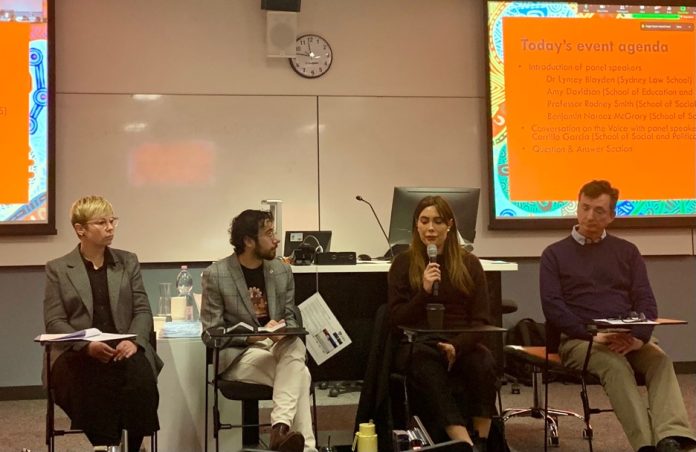Staff and students shared reasons for voting “Yes” in the upcoming referendum on the Voice to parliament in a panel event held at Sydney University.
The “Multi-perspective Conversation on the Voice to Parliament” panel included senior academic staff to provide insight on the historical and legal context as well as First Nations students who offered a personal reflection on what a “Yes” result would mean to them and their communities.
Australians will go to the polls on October 14 to decide if a constitutionally recognised, independent and permanent advisory body should give advice to the Australian Parliament and Government on matters that affect the lives of Aboriginal and Torres Strait Islander peoples.
Associate Dean of Indigenous Strategy and Services, Dr Beatriz Carillo Garcia, said she organised the event to provide the university community with more information as the vote approaches. “Talking to students, we find that they really don’t know the context or what it entails,” she said.
Audience member, Gabby (surname withheld) said she had mostly decided which way she would vote, but the conversation had armed her with information she could share with family and friends.
“Prior to this, I don’t think I would have been able to fully articulate why I would be voting yes. It’s definitely helped me understand the issue,” she said.
Opening the event, Dr Carillo Garcia outlined the significance of the referendum, and said it was the “moment that will define who we are and who we want to become”.
“If Australia as a nation decides to say no to this proposal to give the Voice to Indigenous people, what does that say about who we are and how inclusive we are about other people?” she said after the event.
The Associate Dean said she hopes to organise other opportunities for the University community to learn more about the Voice, including Honi Soit articles and more events.
“I contacted the panel and said, ‘What’s next?’. We have different things in the pipeline,” she said.
Support for the Voice to Parliament has steadily declined since the announcement of the referendum with poll results from Redbridge estimating that 61 per cent of Australians are opposed to the Voice. The results also reveal that around 20-30 per cent of Australians are either undecided or persuadable.
While not represented at the event, several panel members addressed No campaign concerns.
Speaking at the event, Benjamin Narooz McGrory, – SRC’s (Student Representative Council) Indigenous Officer – said the momentum towards a “No” vote was largely due to confusion over the facts, such as the misconception that a “Yes” vote would replace efforts towards a treaty or that it would cede sovereignty.
“It’s just an advisory body. The No campaign is scared of First Nations people standing up to parliament” he said. “Every state and territory has already committed to a treaty. Treaties are happening.”
Sydney Law School professor Dr Lynsey Blayden said the Voice would only enhance and not detract from the movement towards treaty.
“There is a long history of governments walking away from their commitments in treaties,” she said. “An advisory body is permanent.”
Amy Davidson, a First Nations doctoral student, said dispelling myths were important but acknowledged some views would not be possible to change. “There are, of course, legitimate concerns that it won’t work. However, truth telling can be really moving.”
The event comes as Sydney University stressed its responsibility to promote free speech and civil discourse.
A joint message from Chancellor Belinda Hutchinson and Vice Chancellor Mark Scott, indicated they are committed to encouraging information and debate among the university community, despite personal support for the Voice.
The August 23 message states: “We have all agreed that the top priority is for everyone to be informed on the key issues underpinning the referendum, and be engaged in the democratic processes.”


